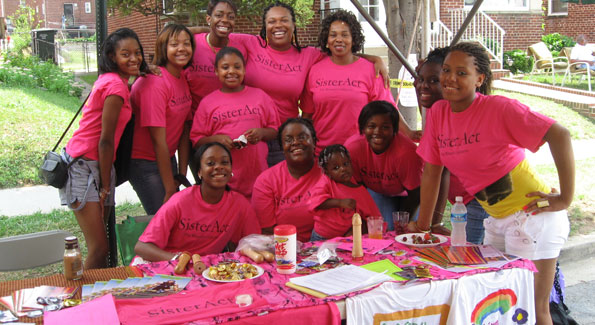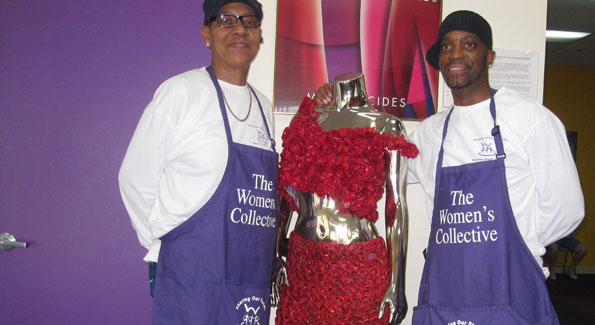This Washington, DC nonprofit cares for 300 women living with HIV/AIDS, and educates and advocates for thousands of others
By Jane Hess Collins

Participants from Sister Act, a The Women's Collective youth-focused HIV prevention program
Robin was lovely, with black hair, ebony skin and fingernails that alternated between purple and leopard print. She broke away from her two friends when she saw our white The Women’s Collective (TWC) van parked on the corner of H and 8th Street and asked for an AIDS test right there on the spot. A friend had told her the day before that he had been HIV positive for at least three months. She signed a consent form. Her big, gold earrings jangled as she shook nervously. She was hiding something, Myra told me.
The Women’s Collective
Strolling down Rhode Island Avenue from the metro to The Women’s Collective is like walking on a treadmill set in a Hollywood sound stage. The background changes continuously from homeless men lounging outside of mom-and-pop liquor stores to luxury condos under construction to established homes with iron-barred windows to an upscale outdoor mall with a TJMaxx, Home Depot and a Giant that belongs in suburban Manassas.
When I entered TWC I was met by a life-sized silver fashion mannequin wearing a two-piece red gown, all made entirely of red condoms. If I didn’t know the TWC mission before I arrived, I knew now.
Founded and directed by Patricia Nalls, herself living with AIDS, TWC began as an anonymous phone line for women suffering from HIV/AIDS that Nalls started when she was diagnosed in 1987. Today TWC cares for 300 of the District’s HIV/AIDS women by providing housing, food, medicine, sexually transmitted disease (STD) screening, and classes to build self-esteem and self-confidence. Many of the 20 staff members have HIV/AIDS, advocate for AIDS survivors or have lost a loved one to the disease.
While having AIDS is not the death sentence it used to be, Nalls said that living with it requires access to a car for medical appointments and money to pay for treatment. Women, especially mothers, often face more challenges than their male peers. Even with Medicaid help, the cocktail of drugs can run upwards of $200 each month, and most mothers, struggling with blue-collar jobs, choose to spend that money to feed their children.
It’s harder for HIV/AIDS women all the way around, said Nalls. Some of her clients are survivors of domestic violence. Most of the women acquired HIV through unprotected heterosexual sex, some of it coerced or forced. Many of TWC’s clients were not told by their partners that they had HIV/AIDS, or they refused to wear a condom.
The TWC staff is used to, but never desensitized to, poverty and death. A makeshift altar in the back of the office is laden with candles. A candle is lit and burned until exhaustion each time a staff member or client dies. A homemade memory book overflows with pictures of departed clients and staff, with entries written by them before they passed away. Most of them wrote notes of praise, thanks and their blessings.
TWC serves a client’s entire family. They offer referrals for support for the grieving family and buys toy for the motherless children for Christmas. A kid’s room, its walls painted with cartoon characters, gives them a happy place to play or read while their mothers meet with their social workers.
Only a rock would be unmoved by it all.
TWC also reaches about 5,000 women throughout metro DC area through its public policy, advocacy and prevention programs. My volunteer project supported the prevention piece. I would ride through the District’s drug and commercial sex areas, educating residents on safe sex practices and TWC’s services, and distributing condoms.
Cruising the Neighborhoods

Myra Witherspoon and Eric Washington flank the infamous red condom dress
“Women’s Collective” was painted in big purple letters on the side of the van. Myra Witherspoon and Eric Washington, both TWC counselors and trained testers for HIV and STDs, climbed into the van with me. We drove into an apartment complex where several men and women were milling around outside and playing checkers.
Myra and I headed for the checker players. She told me to introduce myself and ask if they had been tested in the last year. They eyed me suspiciously. We were in a high drug use area. They probably thought I was a cop, Myra told me. She also warned me to steer clear of groups of young guys since they were probably dealers and might be hostile. I should avoid anyone who looked drunk or high, but should give them a TWC business card and suggest they stop by the office.
Normally I do the direct service work to better feel what a nonprofit volunteer does. Today I hung back while Myra did all of the talking. I was not a local. I had no credibility.
Eric headed toward a woman in a van two parking spaces from us. Just as he was about to say hello he saw that she was shooting up. He gave her the safe sex information card and testing information, and walked away. She said thank you and resumed shooting.
Myra and Eric sometimes drive the streets at 5 a.m. or 7 p.m. to find clients. It was a very slow day for a Wednesday. Even “the” drug dealing corner of DC was empty. Myra and Eric wondered aloud if “Jump Out” day had moved to Wednesdays. Jump Out day is the day that the DC police select to jump out of their patrol cars and bust/arrest groups of young men for dealing drugs.
I had so much to learn.
Next we drove down “Ho Stroll,” a street where a lot of commercial sex workers and their dealers live. Once again it was empty. It might have been because school was in session, and drug dealing and prostitution during school hours is a felony. Like drug dealers, sex workers were reluctant to talk while they worked, although many of them visit TWC to get free condoms. Other sex workers don’t use condoms since they can command a higher price.
Still Myra refuses to be discouraged. “Tomorrow’s a different story,” she says when potential clients refuse her offer to help. She told me how it took her a year to get two young girls in rehab, and when they were finally ready they flagged her down. Another client, who Myra took to rehab five times before she stayed clean, shouted her out at the local farmer’s market, telling everyone within earshot how Myra saved her life.
Angels do walk among us.
We drove up H Street and parked by the 8th Street intersection. Myra pointed out the 11-block stretch along H Street where she distributes handfuls of condoms each month to the barbers and beauty shops owners to give to their clients. Then Robin approached us.
HIV testing has changed a lot since the mandatory testing back in my Air Force days. While the results now take 20 minutes, a client must have protected sex for three months prior to the test to avoid a false positive result.
Testing is done in the van. Myra swabbed the inside of Robin’s mouth with something that looked like a small, white plastic spoon. Next she put the plastic spoon into a little bottle of chemicals, then put the bottle in a light blue plastic holder that was hooked up to an electronic monitor about the size of an iPhone. It worked like a pregnancy test. If, after 20 minutes, one line was visible through a small, clear plastic window on the spoon-like gizmo, the client was HIV negative. If two lines were visible, the client was HIV positive.
While the solution worked its magic, Myra asked Robin the routine questions. How many sexual partners have you had? Do you use protection? How can we contact you? Are you in an abusive relationship?
Silence. Sadness. Robin nodded slowly.
If you test positive for HIV will you hurt yourself?
Twenty minutes crept by. Robin’s two friends, waiting on the sidewalk, hollered at her to hurry up. Myra checked the plastic spoon.
One line.
Jane Hess Collins helps and encourages people to give back through her volunteering, writing, speaking, coaching and workshops. You can follow her other Get Out and Give Back volunteer stories on Facebook, Twitter and her website. If you’d like her to volunteer with your organization, contact her here.
